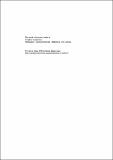| dc.contributor.author | Haugerud, Angelique | |
| dc.date.accessioned | 2011-08-18T14:51:21Z | |
| dc.date.available | 2011-08-18T14:51:21Z | |
| dc.date.issued | 1994 | |
| dc.identifier.citation | Haugerud, Angelique (1994), Studying social change through return visits: an Embu restudy, Working paper no. 494, Nairobi: Institute for Development Studies, University of Nairobi | en_GB |
| dc.identifier.uri | https://opendocs.ids.ac.uk/opendocs/handle/20.500.12413/1106 | |
| dc.description.abstract | This paper outlines research aims and some preliminary findings
from a 1994 restudy of social change in rural Embu District. The
new project updates the author's early 1980s field research, in
rural Kenya, and aims at collecting quantitative and ethnographic
data that will allow comparisons with earlier cross-sectional
data from an intensive study of farmers in the highlands of Embu
D1striof.
The paper discusses analytical and methodological problems of
studying agrarian social change. Persistent challenges include
those of capturing the strengths of both interpretive and more
positivistic or empirical approaches (e.g exploring cultural
constructions of economic "inequality as well as positivistic
'measures' of it); exploring the intertplay of structural
constraints and individual action (the structure/agency problem);
distinguishing recurrent from linear processes of change (cf.
Chayanov 1966), and separating structural change from fleeting
variati ons i n practi se.
Substantive themes to be investigated in the 1994 field study
include changes in farmers' economic strategies, wealth, and land
tenure arrangements (especially in response to growing land
scarcity). The central questions of the restudy are as follows:
What processes of agrarian social differentiation are observable
through longitudinal study rather than cross-sectional analysis?
What are the principal influences on rural household wealth
differences today? How do exchange relations between individuals
~n town and countryside shape rural differentiation processes?
How do Embu people themselves construe changes in their material
well-being (e.g as life-cycle effects, misfortune or good luck,
or the outcome of hard work, laziness, or poor judgment)?
Preliminary findings from the 1994 restudy suggest that well over
half of the original study households believe (for reasons
discussed in the paper) that their material circumstances have
improved since 1980./S1. The study also addresses economic
mobility across generations. Economic changes in the research
area include a sharp increase in coffee cultivation in the former
cotton zone, increased macadamia nut and dairy production in the
middle coffee zone, a possible quintupling of the number of stone
houses, and a higher incidence of land rental. | en_GB |
| dc.language.iso | en | en_GB |
| dc.publisher | Institute for Development Studies, University of Nairobi | en_GB |
| dc.relation.ispartofseries | Working papers;494 | |
| dc.rights.uri | http://creativecommons.org/licenses/by-nc-nd/3.0/ | en_GB |
| dc.subject | Rural Development | en_GB |
| dc.title | Studying social change through return visits: an Embu restudy | en_GB |
| dc.type | Series paper (non-IDS) | en_GB |
| dc.rights.holder | Institute for Development Studies, University of Nairobi | en_GB |
| dc.identifier.blds | 322573 | |


